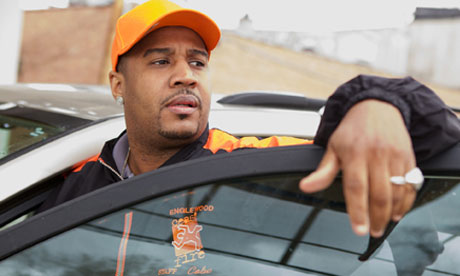|
Reviews of Recent Independent, Foreign, & Documentary Films in Theaters and DVD/Home Video

THE INTERRUPTERS Two patient and insightful chroniclers of inner city life have tracked attempts to climb out of poverty, and they have come to see violence as the prime stumbling block. Director Steve James, renowned for following two high school basketball players in Hoop Dreams (1994), here collaborates with journalist Alex Kotlowitz, the film’s interviewer, who follows up on his best-selling 1991 book There Are No Children Here, about boys growing up in a housing project, and his 2008 New York Times Magazine article about how the organization CeaseFire sets out to change behavior. CeaseFire’s founder, epidemiologist Dr. Gary Slutkin, calmly analyzes violent behavior as a disease that can be prevented with timely and ongoing interventions by paraprofessionals, just like the strategic plans he developed to identify and treat carriers of cholera and AIDS at African refugee camps for the World Health Organization. His lofty cure sounds like the ivory tower professor mocked in David Simon’s The Wire until Tio Hardiman, director of the Violence Interrupters Program, discusses how he makes the concept operational with street savvy. (He even claims he hustled Slutkin for the job, just as he used to work drug hustles before he went back to school.) Unlike law enforcement’s standard attribution of the endless shootings to gang warfare, Hardiman is more sage—“First you make sense out of the madness”—by seeing how it really comes down to interpersonal relations and responses. He supervises weekly roundtable meetings where the staff reviews the potential hot spots in the area that they have identified as key vectors in transmission of violence, such as school closings that have led to turf wars and, most of all, funerals.Then the story closes in on three “interrupters” in their day and night efforts to intervene in crises; their own backgrounds with abuse, violence, and incarceration; and their personal redemptions that led to this commitment. They see their lives reflected in the young people, and they don’t give up during months of difficult one-on-one counseling that is very moving. Genial Ricardo “Cobe” Williams brokers peace between a distraught mother and her ever more aggressive teenage sons, who have turned towards a gang. Tattooed Eddie Bocanegra uses art therapy to coax children to talk through their feelings about how violence has touched them and to creatively channel pent-up emotions. Salty and sweet Ameena Matthews combines her unquestioned credibility as the daughter of a notorious gang leader with the visibility of her modest Muslim dress to command attention. With the film now trimmed down to 125 minutes from its festival length, some of the repetition in their recollections has been reduced, sharpening attention to the moment when they decided, still inexplicably, to change their lives. Looking, ironically, like a ride-along in a nonviolent version of a cops reality show, the film is especially dramatic when the social rhetoric matches the street action when the interrupters fearlessly divert retaliation on street corners, in schools, and especially at funeral services. They try buying just enough time for emotions to cool and negotiate deals regardless of the crimes involved. Near the end of the film is a powerful sequence when a young ex-felon is inspired to prove his maturity by apologizing to the victims he robbed. Neither he nor his mentor is prepared for their reaction. His presence so shakes them that they can hardly look at him, and for the first time he sees his actions from their traumatized point of view and how he affected a whole family. His admiring interrupter admits he hasn’t had the guts to do the same. In the epilogue, we see just how much this young man’s new-found stability has benefited him and his community, proving that the cycle can be interrupted, one person at a time.
The founder is exporting these methods, whose success has been
documented with a decrease in shootings, to other cities (including
The Wire’s Baltimore) and other countries—the techniques recall
efforts to re-educate child soldiers in Africa. Though Oprah-esque, the
film
will be broadcast as a Frontline special on PBS later this year,
presumably with bleeping of the considerable profanity.
Nora Lee Mandel
|

